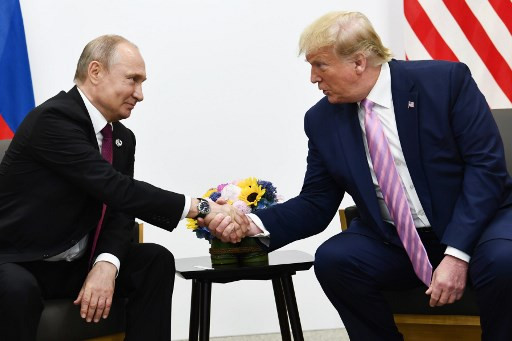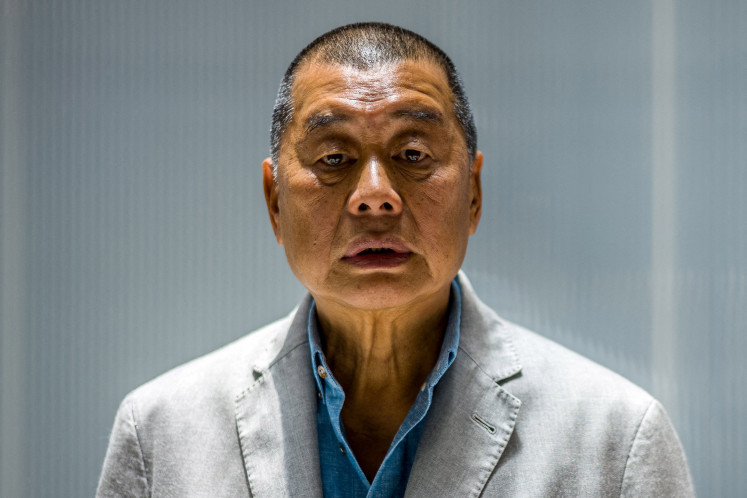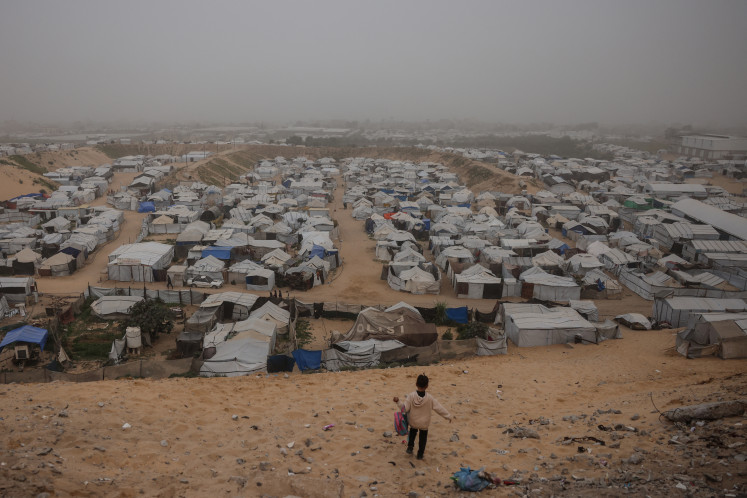Popular Reads
Top Results
Can't find what you're looking for?
View all search resultsPopular Reads
Top Results
Can't find what you're looking for?
View all search resultsUS, Russia forge ahead on peace talks, without Ukraine
As the 4-1/2-hour meeting in the Saudi capital was underway, Russia hardened its demands, notably insisting it would not tolerate the NATO alliance granting membership to Ukraine.
Change text size
Gift Premium Articles
to Anyone
U
nited States President Donald Trump's administration said on Tuesday it had agreed to hold more talks with Russia on ending the war in Ukraine after an initial meeting that excluded Kyiv, a departure from Washington's previous approach that rallied U.S. allies to isolate Russian President Vladimir Putin.
As the 4-1/2-hour meeting in the Saudi capital was underway, Russia hardened its demands, notably insisting it would not tolerate the NATO alliance granting membership to Ukraine.
Later on Tuesday, Trump said he was more confident after the talks and he would probably meet with Putin before the end of the month.
"Russia wants to do something," Trump told reporters in Palm Beach, Florida. He brushed aside Ukraine's concern about being left out of the meeting and said Kyiv should have entered talks much earlier.
"I think I have the power to end this war," said Trump.
The talks in Riyadh were the first time US and Russian officials met to discuss ways to halt the deadliest conflict in Europe since World War Two. Ukraine has said it will not accept any deal imposed without its consent, and German Chancellor Olaf Scholz reiterated "there must be no decision over the heads of Ukraine."
Even before the talks took place, some European politicians accused Trump's administration of handing free concessions to Moscow last week by ruling out NATO membership for Ukraine and saying it was an illusion for Kyiv to believe it could win back the 20% of its territory now under Russian control.
US National Security Adviser Mike Waltz told reporters in Riyadh that the war must come to a permanent end, and this would involve negotiations over territory.
"Just a practical reality is that there is going to be some discussion of territory and there's going to be discussion of security guarantees," he said.
High-level teams would begin talks on ending the conflict and would separately work to restore the countries' respective diplomatic missions in Washington and Moscow to ease the talks going forward, US Secretary of State Marco Rubio said.
Rubio said he came away from the initial talks convinced that Russia was "willing to begin to engage in a serious process" but that reaching peace would involve concessions from all sides.
Russia offers no concessions
Russian officials did not mention offering any concessions and US officials did not claim to have scored any in Tuesday's meeting, leading observers to doubt whether the talks would turn into serious peace negotiations.
Addressing Ukrainian and European concerns, Rubio said no one was being sidelined and any solution must be acceptable to all parties.
Rubio later spoke to the top diplomats of France, Germany, Italy, Britain and the EU to brief them on the talks, State Department spokesperson Tammy Bruce said.
Both sides said no date had been set for a meeting between Trump and Russian President Vladimir Putin, which both men say they want.
Ukrainian President Volodymyr Zelenskiy said he had postponed a visit to Saudi Arabia planned for Wednesday until next month. Sources familiar with the matter said the decision was made to avoid giving "legitimacy" to the US-Russia talks.
Kyiv says talks on how to end the war should not be held behind Ukraine's back.
Ukraine ultimately will have a vote on whether to accept a deal negotiated between Washington and Moscow, and could reject a bad one, cautioned Evelyn Farkas, executive director of the McCain Institute and a former senior Pentagon official.
"In the worst case scenario, Ukraine will keep fighting. If their defenses crumble, I don't think that the American people want to see those pictures on television and to be held responsible," Farkas said.
As European countries discuss the possibility of contributing peacekeepers to back any Ukraine peace deal, Russian Foreign Minister Sergei Lavrov said in Riyadh that Moscow would not accept deployment of NATO troops there, whatever flag they were operating under.
"Of course, this is unacceptable to us," he said.
The comments by Lavrov signaled that Russia will keep pressing for further concessions in the negotiations. The opening encounter on Tuesday saw Lavrov and Kremlin foreign policy aide Yuri Ushakov - two veterans who have spent a combined 34 years in their current roles - negotiate with three Trump administration officials in their first month on the job.
"So far I have seen zero evidence that Putin is willing to give one inch in order to negotiate a peace deal," Michael McFaul, who served as US ambassador to Russia under former President Barack Obama, wrote on X.
Potential 'economic partnerships'
Lavrov said there was "high interest" in lifting economic barriers between the two countries. After the invasion, the US and other Western countries imposed waves of sanctions on Moscow.
Rubio said European countries have also imposed sanctions, so they would have to be involved in talks on lifting the measures. If the conflict ultimately ended, he added, it would "unlock" opportunities for US-Russian cooperation, including "some pretty unique, potentially historic economic partnerships."
The fast-moving diplomacy, beginning with a Putin-Trump phone call only six days ago, has triggered alarm in Ukraine and European capitals that the two leaders could cut a quick deal that ignores their security interests, rewards Moscow for its invasion and leaves Putin free to threaten Ukraine or other countries in the future.
Tuesday's talks also sparked concern in Washington, which has backed Ukraine's defense with billions of dollars of military aid approved by the US Congress on a bipartisan basis.
"Russia has won Round One," US Representative Jake Auchincloss, a Massachusetts Democrat who is a co-chair of the bipartisan House Ukraine caucus, told Reuters.
"The Kremlin has been normalized in bilateral diplomacy that excludes Ukraine and NATO, and they gave up nothing to get that."
Your Opinion Matters
Share your experiences, suggestions, and any issues you've encountered on The Jakarta Post. We're here to listen.
Thank you
Thank you for sharing your thoughts. We appreciate your feedback.










